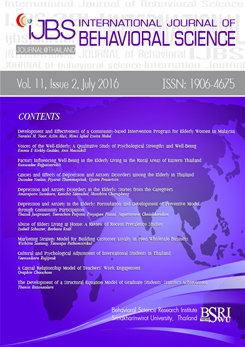Development and Effectiveness of a Community-based Intervention Program for Elderly Women in Malaysia
Main Article Content
Abstract
The present study, using a health empowerment approach, developed a community-based intervention program for elderly women, and evaluated its effectiveness. The program covered five areas—physical health, cognitive functioning, affect and control, social functioning, and religion—and ran for 10 weeks, 90 minutes per week. Using an experimental design, a group of 18 elderly women were placed in the intervention group while another 18 served as controls (Group). Four well-being measures (memory and attention, religiosity, social engagement, and anxiety and depression) were used to assess the effectiveness of the program, before and after the program (Time). Qualitative interview data from participants and family members were also gathered to provide additional input on the effectiveness of the program. Results showed significant main effects of Time for religiosity and memory and attention. More importantly, results indicated significant Group x Time interactions for religiosity as well as memory and attention, with the intervention group reporting more changes in their mean scores over time compared to the control group. These quantitative findings were generally supported by the qualitative interviews. These findings are deemed beneficial in building women’s personal and social resources.
Keywords: community-based intervention, development, effectiveness, well-being

